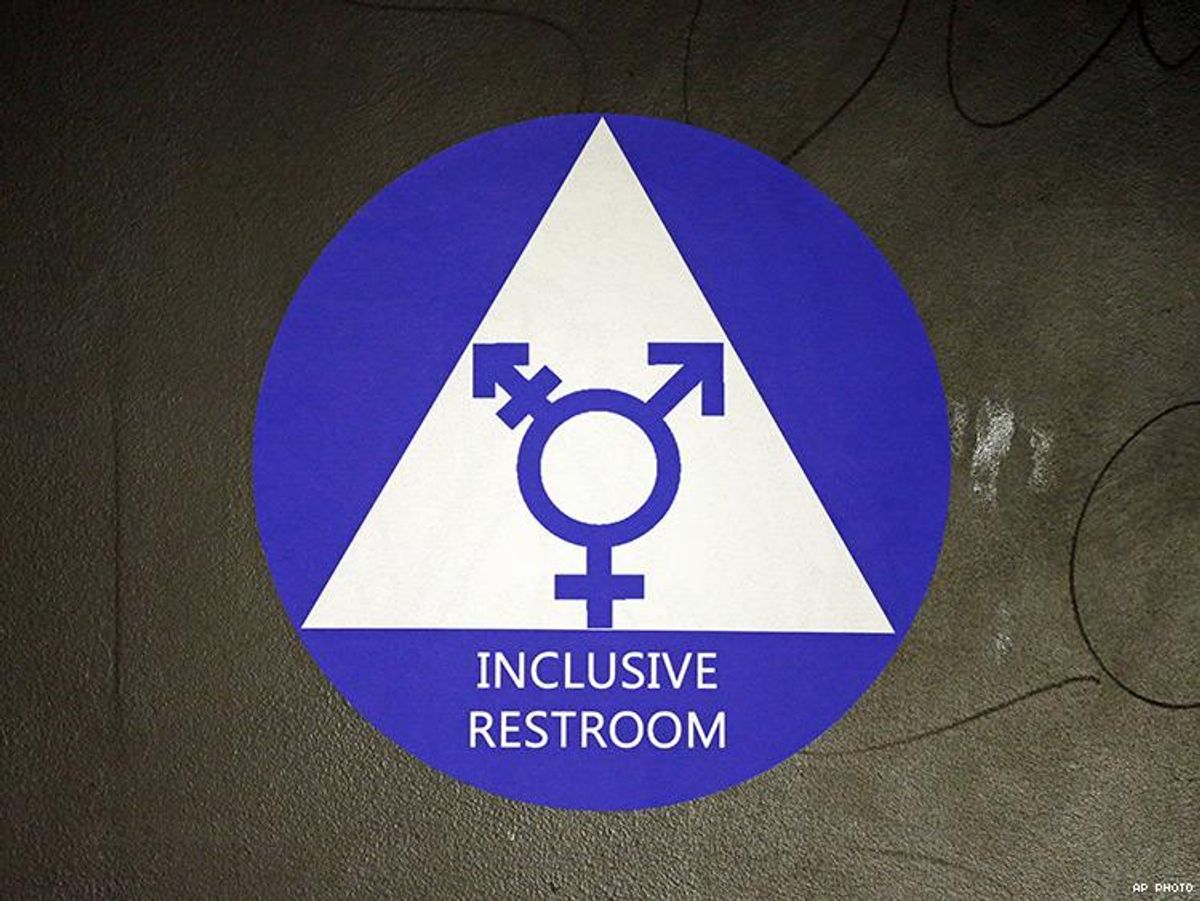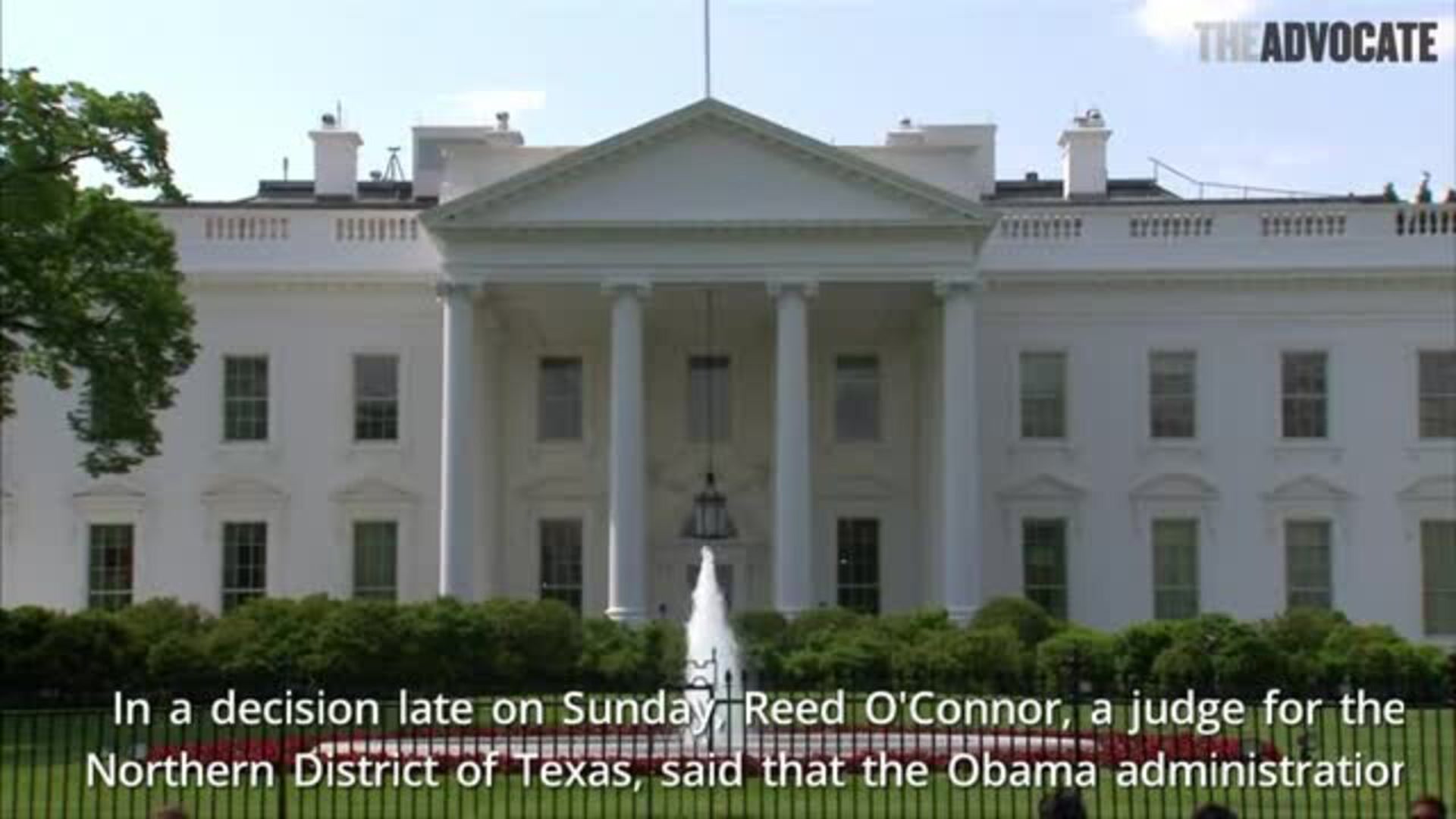Just days before students around the country head back to school, a federal judge has blocked trans-affirming education guidelines issued by the Obama administration.
U.S. District Judge Reed O'Connor issued his ruling late Sunday, granting the request of 13 states, led by Texas, for an injunction that effectively halts implementation of the administration's guidance. The injunction takes effect immediately nationwide and remains in place until the court issues a final ruling on the merits of the case. Schools, states, and employers that already have in place trans-affirming policies may continue to enforce them.
Although the guidance, issued by the federal Departments of Education and Justice in May, is not legally binding, the judge still determined that the administration had not followed proper protocol in drafting the guidelines.
The 38-page decision begins by adopting the framing of the 13 states seeking to disregard the guidance, explaining that "this case presents the difficult issue of balancing the protection of students' rights and that of personal privacy when using school bathrooms, locker rooms, showers, and other intimate facilities, while ensuring that no student is unnecessarily marginalized while attending school."
While the particular issue in question in this case is whether transgender students should be allowed to use the bathrooms, locker rooms, and other sex-segregated facilities at public schools that correspond with their gender identity, the broader issue comes down to the interpretation of existing civil rights law.
The administration's position, summarized in the May guidance (which itself was built off years of legal precedent in favor of trans-affirming policies), is that current legal prohibitions on discrimination based on sex also extend to protection from discrimination based on gender identity. The central statutes under debate are Title IX of the Education Amendments of 1972 and Title VII of the Civil Rights Act of 1964. Both of those laws prohibit sex-based discrimination by agencies, employers, and schools -- in the latter case, schools that receive federal funding.
When the administration made its case in Judge O'Connor's courtroom at the U.S. District Court for the Northern District of Texas in Fort Worth August 12, attorneys argued that the guidelines have not yet been enforced, which means the states suing have no ground upon which to file suit. Although the guidelines suggest that schools could lose federal funding if they fail to comply with the guidelines, the administration has not launched any inquiries or investigations around compliance at any school in the country.
The administration further claimed that the guidelines were not subject to standard public comment and review periods because they are "interpretive rules" that are explicitly identified as not carrying the weight of law. According to the administration, the guidelines are indeed just guidance, which should be used to help school districts understand how the federal government understands schools' responsibility under Title IX and Title VII.
The judge argued that the administration did not issue the guidelines through proper channels, most pointedly because it did not seek a period of public comment on the guidelines before issuing them. The judge also claimed that the Administration's guidance contradicts "existing legislative and regulatory texts," later pointing to state and federal laws that allow for the creation of facilities segregated by sex.
The ruling agrees with the states' claim that the guidelines effectively force school districts "to redefine who may enter [bathrooms, locker rooms, etc.] apart from traditional biological considerations." It also agrees with the plaintiffs' claims that sex exists only as a binary (male or female) biological reality, and concludes that the legal prohibition on sex discrimination was created solely as a way to ensure equality between men and women. Title IX's text is "not ambigious," the court declares.
Further, the court claims that the administration's action after the issuance of guidance -- most notably filing a federal civil rights lawsuit against North Carolina over that state's transphobic law -- indicates that the guidelines are in fact "compulsory in nature."
"The information before the Court demonstrates Defendants have 'drawn a line in the sand' in that they have concluded Plaintiffs must abide by the Guidelines, without exception, or they are in breach of their Title IX obligations," the judge writes. He continues: "The Guidelines are, in practice, legislative rules -- not just interpretations or policy statements because they set clear legal standards."
The ruling makes scant mention of the impact an injunction would have on transgender students. When trans people are directly mentioned in the decision, Judge O'Connor calls them "transgendered" people, a grammatically incorrect (and, according to some, offensive) way to reference people whose gender identity does not correspond with their sex assigned at birth. The most prominent discussion of the reality of transgender students appears in the court's references to Gavin Grimm's case out of Virginia, falsely claiming that the school district in that case simply made an accommodation for the transgender teenager. In reality, that case is currently pending before the U.S. Supreme Court, and the decision, however it comes down, will have sweeping implications nationwide. Judge O'Connor does acknowledge that a decision from the Supreme Court could make the case currently before him moot.
Several prominent LGBT advocacy organizations slammed O'Connor's decision, issuing statements pointing out the harm transgender students are likely to face in the wake of this decision. Indeed, the ruling fails to acknowledge that the administration's guidance did not open all bathrooms to members of both sexes. The guidelines merely indicated that all students, whether transgender or cisgender (nontrans), must be allowed to access facilities based upon their gender identity.
"Today's order is an attack on transgender people," said Southern Poverty Law Center deputy legal director David Dinelli. "This case reflects an overreaction by many states to federal guidance about transgender schoolchildren. We are disappointed that this particular court has failed to understand what it means to be transgender. But we are confident that, over time, our courts will recognize that transgender children, like all children, feel safe and thrive when they are given equal opportunity to succeed. We are committed to this fight and will not stop until all of our kids enjoy safety and dignity in their schools and communities."
But the five civil rights organizations that filed a joint brief supporting the administration's guidance took a big-picture approach in a joint statement issued Monday morning:
"A ruling by a single judge in one circuit cannot and does not undo the years of clear legal precedent nationwide establishing that transgender students have the right to go to school without being singled out for discrimination," read the statement from Lambda Legal, the American Civil Liberties Union, the National Center for Lesbian Rights, Transgender Law Center, and GLBTQ Legal Advocates and Defenders. "This unfortunate and premature ruling may, however, confuse school districts that are simply trying to support their students, including their transgender students. So let us make it clear to those districts: your obligations under the law have not changed, and you are still not only allowed but required to treat transgender students fairly. The scope of this injunction has no effect on the ability of other courts or lawyers representing transgender people to continue to rely on the federal government's interpretations of Title IX or on prior decisions that have reached similar conclusions about the scope of federal sex discrimination laws."
Human Rights Campaign legal director Sarah Warbelow offered a word of encouragement to transgender students and affirming schools in her statement Monday morning:
"Judge O'Connor's decision to bar the Department of Justice from enforcing this important guidance puts thousands of transgender students at even greater risk of marginalization, harassment, and discrimination as they return to school this fall. All students, regardless of their gender identity, deserve to be able to learn in an environment free from discrimination. Despite this judge's decision, schools are not barred from following the federal guidance, and school administrators still have a responsibility to ensure that the civil rights of all students are respected and that transgender students have access to facilities consistent with their gender identity. As lawsuits on the scope of Title IX proceed, we believe that justice will prevail as courts continue to recognize that discrimination against transgender students is a form of sex discrimination."




















































































